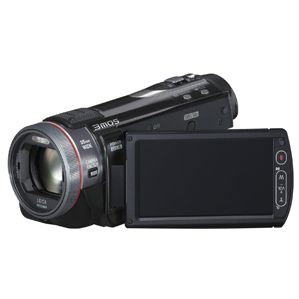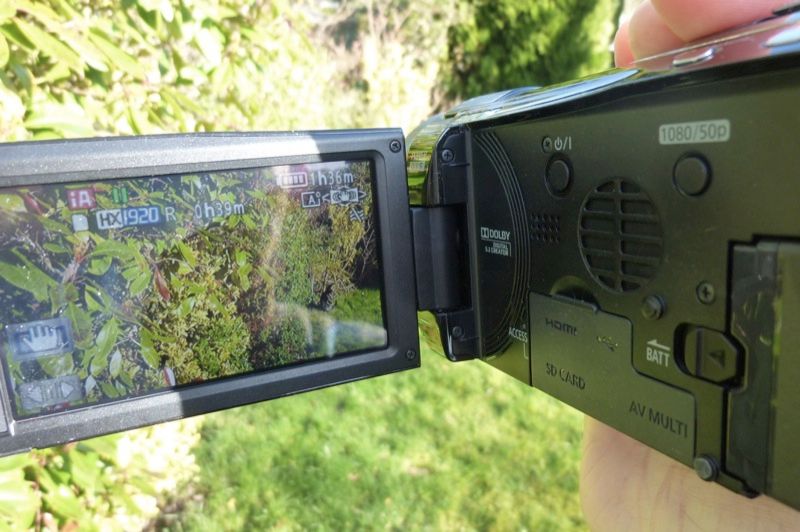Panasonic has slashed the entry price of DIY 3D by expanding its range of 3D compatible camcorders and making the conversion lens an optional £280 accessory. You can now step up to 3D via the £899 HDC-SD900, the most affordable new member of the brand’s high-spec 3MOS lineup. Despite tipping the scales at a very manageable 400 grams, the SD900 camcorder bristles with advanced functionality. Fronting the HDC-SD900 is an excellent Leica Dicomar Lens, equivalent to 35mm.
Our quick take
Overall, the HDC-SD900 is a terrific high-def camcorder. The fact that you can bolt a 3D lens on should be considered a secondary bonus. The model is light, has a superior Leica-certified lens and delivers astonishingly fine pictures. For those that don’t want to be restricted to SD cards, two step-up models are also available: the HDC-TM900 offers 32GB of internal memory, while the top of the line HDC-HS900 has a 220GB hard drive.

Panasonic HDC-SD900 - 4.5 / 5
| FOR | AGAINST |
|---|---|
|
|
Naturally you can compose with either the viewfinder or the flip-out 3.5-inch touchscreen monitor. The latter offers some cool creative refinements. We particularly like the way you can isolate a subject with a prod and the camera will lock to the object and dynamically track it while you, or it, moves. The image quality of the screen is excellent; it’s just about bright enough for overcast outdoor use, although we suspect you’ll see nothing when shooting on a beach over summer.
Build quality is excellent. The glossy chassis looks great and various compartments (mic and headphone jack, power jack, SD card, etc) are cleverly accommodated. Connectivity includes an HDMI 1.4 output and an AV Multi output for Component.
The brand's optical image stabilisation system has been overhauled for 2011 models. The Hybrid OIS used here is a combination of optical and electronic techniques, and even quite aggressive wobbling was negated by the camcorder's forgiving memory.
Panasonic has placed a welcome emphasis on genuinely helpful features. For those shoots when you can’t risk missing a thing, there’s a pre-rec buffering mode which allows images to be recorded 3 seconds before the Start/Stop Rec button is even pressed. There are also a number of Scene presets (Portrait, Sports, Spotlight, Low Light, Night Portrait, Night Scenery, Snow, Beach, Sunset), where the camera auto optimises. To be honest, we rarely felt compelled to stray far from camera’s auto functionality, as it works so well.
Given the price of this camera, picture quality can be considered extraordinary. You have a choice of shooting modes, from variable bitrate AVCHD, to 1080/50p (the best quality option from the camera, but one that generates files so huge only a Krypton-powered PC can handle it) and Apple’s lightweight iFrame nonsense. The latter will win this model plenty of friends in the Mac community, but it’s standard def and fuzzy compared to AVCHD.
The best shooting option is the HG grade AVCHD mode. The level of fine detail captured here belies the SD900's diminutive dimensions. Beneath the hood, a revamped Crystal Engine PRO processor, coupled to the large 46-mm diameter F/1.5 lens, keep video noise largely bay, even in low light. Motion across all modes is velvety smooth. The 3MOS imaging sensor processes red, green and blue independently, so colour integrity is outstanding.
On Panasonic’s solitary 2010 3D model, the HDC SDT750, the 3D lens was included as part of the package. This year you’ll need to buy it as an accessory. In many ways, this is a better option.
The VW-CLT1 converter needs to be calibrated once attached (it’s a quick, through-the-lens adjustment), but after you’re good to go. Being rather bulky it changes the balance of the SD900, but not disastrously so. Using the camcorder becomes more of a two-handed operation. There’s been no change to 3D lens itself; it’s exactly the same contraption we tested last year.
You lose the ability to focus once the lens is attached, which is rather inconvenient, but it doesn’t take long to adjust. The camera shoots in a side-by-side half resolution format, so it’s more comparable to DVD quality than HD. The 3D depth effects work well provided you place objects reasonably close to the lens. The convergence point is fixed at 1.5m approx. Anything in front of this becomes an “outy” effect. It’s great fun experimenting with composition to see what works and what doesn’t. It should be noted that all 3D footage comes with a thick border to the image - this can’t be removed.
To recap
The HDC-SD900 is an affordable 3MOS camcorder capable of stunning HD image quality. While its 1080/50p shooting mode will have pro-users salivating, the rest of us will not be left wanting by its AVCHD performance. Throw in some of the best IA management in the business, plus a solid digital stills performance and you have a versatile shooter that’s a dream to use


